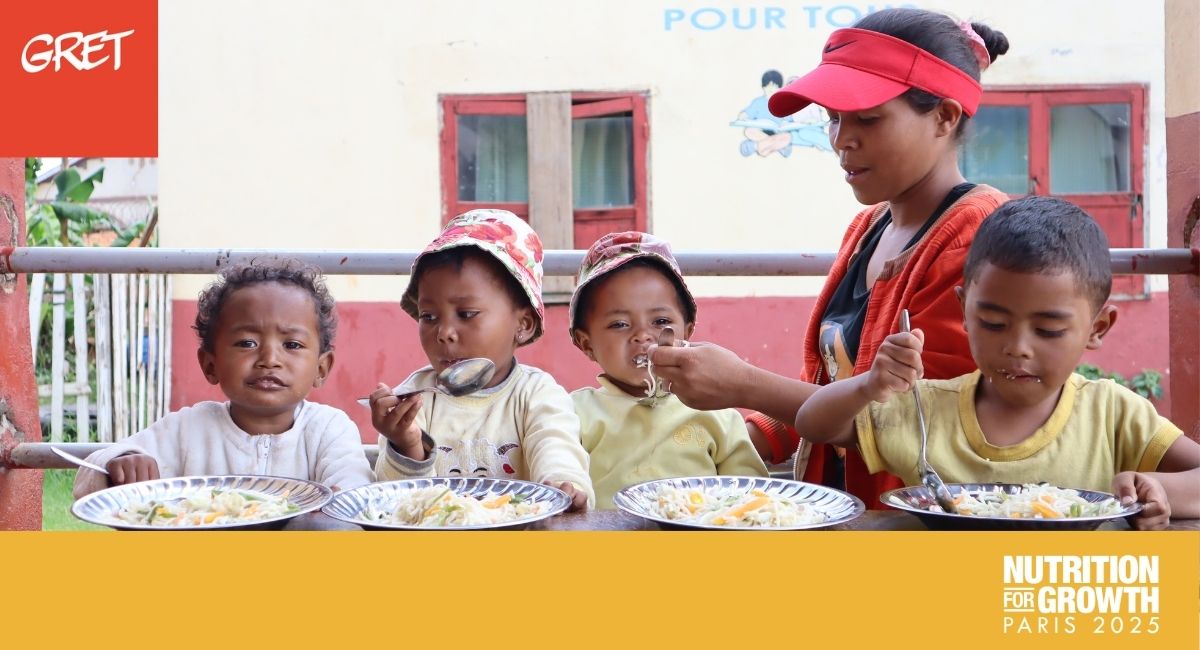Faced with new sanitary constraints related to the Covid-19 pandemic, GRET and its partners in the Fopat project in Niger have innovated to enable activities raising awareness on nutrition to be continued. Community radios have become a key resource in the fight against the Covid-19 pandemic and malnutrition in rural areas.
Since 2017, the Fortification of commonly consumed processed food products in Niger (Fopat) project, funded by the European Union and the Principality of Monaco, has been aiming to support structuring of local processed food product value chains. This project, which is being implemented by GRET and the World food programme (WFP) in four regions of Niger – Dosso, Tahoua, Maradi and Zinder – aims to enable locally processed products to be evaluated safely and reliably. With ten awareness-raising facilitators working in the regions, the Fopat project is providing information to communities so that they can improve their practices and knowledge on the benefits of food that is balanced and diversified, combined with strengthening of hygiene measures.
Necessary restructuring of awareness-raising activities
Following the health crisis related to the Covid-19 pandemic and in order to avoid exposing facilitators and rural communities to the spread of the virus, GRET refocused its awareness-raising strategy on remote actions, in particular via community radio stations. Awareness-raising messages on barrier gestures and hygiene were added to awareness-raising on food and nutrition.

Radio shows were produced by the project facilitators, together with radio hosts in the partner radio stations. Previously trained in the various messages to be broadcast, they received support from members of the Health services in the districts.
Apart from awareness-raising events, radio debates were also organised, in particular via a monthly Q&A session on messages broadcast in recent months. The object is to enable communities to remember advice and essential messages conveyed during the sessions and to apply these in their daily lives. The debate shows are organised with the support of nutrition focal points and community leaders, in particular village chiefs and chairpersons of the fortified food product production units.
Involving communities in this new media
In order to reach as many people as possible, town criers were mobilised to inform populations the evening before and on the actual day of the various sessions and debates. This prior information and the variety of debates broadcast enabled massive participation of rural communities targeted by the project. People gathered in groups around radio receivers to listen to the awareness-raising messages and debate shows.

This enthusiasm was made possible by the preparatory work in communities carried out upstream by the facilitators, town criers and village chiefs. Prior to the launch of radio activities, communities were informed of facilitation session and debate show broadcast times, in order to maximise the number of listeners.
Despite a difficult context, the Fopat project activities are therefore still being developed and are even opening up new perspectives in terms of awareness-raising in rural areas. This successful experience will be continued as part of the project and could even be replicated in other areas where GRET is operating.
Testimonies
“Thanks to the messages I heard on the Kakaki radio station, I am more careful about hygiene at home, in particular about handwashing with soap and water. It’s practical advice that is easy to apply and can prevent us from becoming sick. Almost all the men in the village heard the messages, because they all have a radio receiver, and everyone here listens to Kakaki.”
Idi Hamissou, a resident in the village of Sarkin Hatsi
“One of the main objectives of community radio is to raise the awareness of rural communities through educational shows. We were trained to do this. The recent launch of the debate shows, which were particularly popular with our listeners, is a new development.”
Oumarou Hassane, host with the Murya Gabass community radio station in Djirataoua

“As members of the Haddin Kaye mata union, we were informed of the launch of the awareness-raising sessions via the Kakaki radio station by the town crier. I asked all our members to make sure to listen to the radio shows at home, because at the moment we have to stop gatherings to respect government instructions and fight against the spread of the coronavirus. Our husbands also listened carefully to the messages on the radio and we talked a lot about these subjects.”
Hadjia Tchima, chairperson of a cooperative in Sarkin Hatsi
“The messages on hygiene, in particular handwashing with soap and water, are coherent with religious requirements. When I heard them on the radio, I asked everyone to follow the advice given: wash our hands with soap and water each time we leave the toilet, before we eat and when we touch animals, and ask everyone in our household to do so too. Thanks to the Mura Gabass radio station.”
Malam, religious leader in the village of Keguel
“We conduct awareness-raising actions on hygiene and more generally on good nutrition for the entire population at every opportunity. Admittedly, we are often confronted with a problem in terms of funding. Yet communities really need to be informed. So, support from NGOs is always appreciated by the Health district managers. Personally, I think these facilitation sessions and debate shows significantly contributed to making communities aware of the advantages of applying hygiene measures and respecting barrier gestures.”
Mamane Kabirou, Nutrition focal point in the Madarounfa Health district.
This publication was produced with the support of the European Union. Its content is the sole responsibility of GRET and can in no way be considered to reflect the views of its financial partners.






